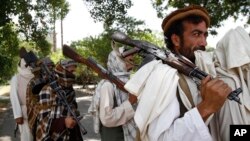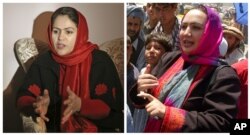In an unprecedented step, representatives of the Taliban met this week with a delegation of female Afghan lawmakers and peace negotiators, according to the Afghan government and the Taliban.
The meetings, which conclude Friday in the Norwegian capital Oslo, are part of a long-term Afghan peace initiative sponsored by Norway.
Although all sides emphasize the preliminary and unofficial nature of the discussions, the meetings represent a historic step for the militant group, which harshly restricted the freedoms and rights of women during its five-year reign in Afghanistan.
A Taliban spokesman, Zabihullah Mujahid, confirmed its representatives held talks in Norway this week to exchange views on the current situation in Afghanistan.
But in his statement sent Friday to media outlets, including VOA, Mujahid reiterated that these “interactions do not mean engaging in peace talks with our opponents.” He was referring to the Afghan government.
Gathering viewpoints
Mujahid said the Taliban is engaging in such meetings to listen to views of Afghan intellectuals, civil society members and politicians as part of its efforts to end the war against “foreign occupation of Afghanistan” and bring peace and prosperity to the country.
Through such gatherings, he added, the Taliban also want to convey their Islamic viewpoint to the Afghan people to help remove any worries about Taliban policies.
According to an Afghan government official, five female parliamentarians, including prominent women's rights advocates Fawzia Koofi and Shukria Barakzai, took part in the talks as well as female representatives of Afghanistan's High Peace Council, a government body charged with negotiating an end to the war with the Taliban.
The official, speaking on condition of anonymity because he was not authorized to brief the media, emphasized that the women were acting as "independent representatives" from parliament.
"They are not part of any (Afghan) government initiative, and were invited to an unofficial meeting, not as official delegates," he said.
The Afghan official said the Taliban's representatives to the talks were Sher Mohammad Abbas Stanekzai, a former senior official of the Taliban regime that controlled Afghanistan until December 2001, and Mohammad Zahid Ahmadzada, who was a junior diplomat in that regime.
The official said the talks took place on June 3 and 4, but Norway's Foreign Ministry spokesman Frode Andersen said the meetings would conclude on Friday.
Turning point
Even in an unofficial capacity, the meeting of Taliban representatives with Afghan female leaders represents a potential turning point in the militant group's positions.
During its 1996-2001 rule of Afghanistan -- before being ousted by a U.S.-led invasion -- the Taliban banned women and girls from education and work, and banned them from going outside unless wearing an enveloping cloak known as burka and accompanied by a male relative.
In modern-day Afghanistan, prominent women are regularly targeted by the insurgents, and some have been killed. Barakzai survived a suicide-bombing assassination attempt late last year, though no claim of responsibility was made for the attack.
Afghan President Ashraf Ghani has prioritized bringing the Taliban to the negotiating table and ending their insurgency. And some activists have expressed concern that the government would trade concessions on women's right issues. But Ghani, and his high-profile wife, Rula, have said there will be no roll-back of hard-won constitutional protections for Afghan women as part of any peace deal.
Ghani's office issued a statement saying all Afghan citizens had the right to "work for peace where and whenever they want."
"We appreciate these are non-government talks, they are not representing the government of Afghanistan," the statement said.
The Norwegian Foreign Ministry confirmed the discussions had taken place between "Afghans of different political backgrounds ... expressing their personal views."
The meeting is the third face-to-face contact between Taliban and Afghan officials in recent months, though both sides have stressed their informality.
Recent meetings in Qatar between Taliban representatives and High Peace Council members resulted in a Taliban statement that appeared to indicate a softening on some policies and a possible willingness to eventually enter into a dialogue with the Afghan government. But actual formal peace talks are seen by diplomats and other observers as being years away.
In the meantime, each side is fighting for supremacy on the battlefield, as the Taliban's summer offensive has spread across the country and Afghan forces are taking huge casualties -- fighting alone following the departure last year of most international combat troops.
Ayaz Gul contributed to this report from Islamabad.





